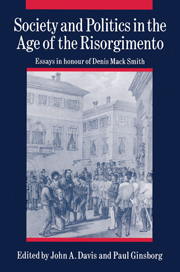Book contents
- Frontmatter
- Contents
- List of figures and maps
- List of contributors
- Preface
- Map 1 Italy in 1815
- Map 2 Italy in 1870
- Map 3 Italy – place names
- 1 1799: the Santafede and the crisis of the ancien régime in southern Italy
- 2 War and society in Napoleonic Italy: the armies of the Kingdom of Italy at home and abroad
- 3 The poor and how to relieve them: the Restoration debate on poverty in Italy and Europe
- 4 Bandits, violence and the organization of power in Sicily in the early nineteenth century
- 5 Marriage and the family in Italy in the early nineteenth century
- 6 After the Revolution: bandits on the plains of the Po 1848–54
- 7 Labouring women in northern and central Italy in the nineteenth century
- 8 Garibaldi in England: the politics of Italian enthusiasm
- 9 The middle classes in Liberal Italy
- 10 Francesco De Sanctis: the politics of a literary critic
- Bibliography of Denis Mack Smith's writings on nineteenth-century Italy
- Index
7 - Labouring women in northern and central Italy in the nineteenth century
Published online by Cambridge University Press: 30 January 2010
- Frontmatter
- Contents
- List of figures and maps
- List of contributors
- Preface
- Map 1 Italy in 1815
- Map 2 Italy in 1870
- Map 3 Italy – place names
- 1 1799: the Santafede and the crisis of the ancien régime in southern Italy
- 2 War and society in Napoleonic Italy: the armies of the Kingdom of Italy at home and abroad
- 3 The poor and how to relieve them: the Restoration debate on poverty in Italy and Europe
- 4 Bandits, violence and the organization of power in Sicily in the early nineteenth century
- 5 Marriage and the family in Italy in the early nineteenth century
- 6 After the Revolution: bandits on the plains of the Po 1848–54
- 7 Labouring women in northern and central Italy in the nineteenth century
- 8 Garibaldi in England: the politics of Italian enthusiasm
- 9 The middle classes in Liberal Italy
- 10 Francesco De Sanctis: the politics of a literary critic
- Bibliography of Denis Mack Smith's writings on nineteenth-century Italy
- Index
Summary
THE LEGACY OF THE ANCIEN RÉGIME
In Italy, as elsewhere, waged work for women did not have its origins in the factory system. Quite the opposite is true: industrialization only reinforced and perfected tendencies which were already very much part of Italy's previous economic development. In fact, at the end of the nineteenth century the fierce objections to a bill regulating the condition of women's factory work derived not only from women's essential role in factories but also from their contribution to other crucial sectors of the economy, like agriculture and the putting-out system, both still organized along traditional lines. The condition of women in nineteenth-century Italy can best be summarized as follows: a yawning gap existed between the importance of women's labour in production and the minimum recognition accorded to them in terms of political and civil rights. So vast a discrepancy had its roots deep in the society of the ancien régime.
The case of Venice at the end of the eighteenth century and the beginning of the nineteenth illustrates the importance of women's work in the economic life of a great urban centre. ‘Nearly all the women of the lower classes work for the Arti’, noted Apollonio Del Senno, author of a commentary on the 1797 census of arts and crafts in the city. The registers of craft guilds reflect the variety of women's work, from the making of buttons, pearls, and bracelets to that of shoes and hats; from the working of gold, pewter, and glass to serving in barbers' shops and selling spirits.
- Type
- Chapter
- Information
- Society and Politics in the Age of the RisorgimentoEssays in Honour of Denis Mack Smith, pp. 152 - 183Publisher: Cambridge University PressPrint publication year: 1991
- 8
- Cited by



